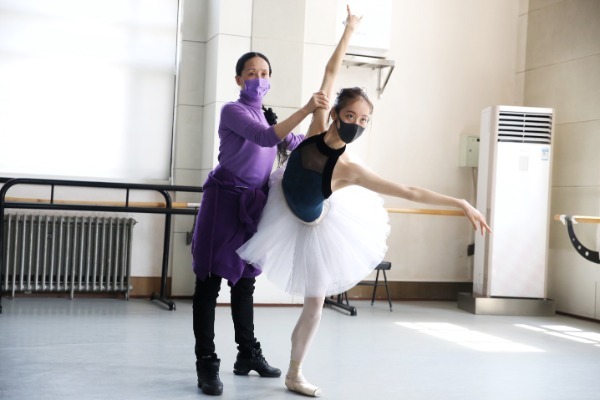Annual ballet workshop theme will reflect on pandemic


Because of the viral outbreak, he has stayed with his parents for months, which made Wang realize that he should have spent more time with them.
"I realized that my parents are not young any more. For example, my father takes medicine every day to control his blood pressure. It inspired me to think about my relationship with my parents and to create the documentary, A Lesson, to share with my students," Wang says.
The scenes of Wang's parents at home are featured in his video piece and Wang also asked his students to dance with their parents, which is also included in the production.
"It's a lesson for all of us, to learn and to reflect when our lives are turned upside down by the virus," he adds.
Other works to be staged during the ballet workshop include Guardian Angel, choreographed by Zheng Yu, a dancer of the National Ballet of China, which centers on the health workers fighting on the front lines against the coronavirus; 36.2, choreographed by Hu Yang, principle dancer with China National Opera& Dance Drama Theater and In Mist and Rain-Autumn, choreographer Li Yang's latest piece, which mourns the people who died as a result of the pandemic.
For Wang, the ballet workshop means a lot to him personally, since his debut choreographic work was staged at the inaugural workshop in 2010, when Feng Ying, president of the National Ballet of China, decided to launch the initiative to inspire and showcase young choreographers.
"You don't have to be a choreographer to join in the workshop. You can test your ideas to see if you want, and have the talent, to become a choreographer. Anything could inspire you to create and you are allowed to make mistakes," Wang says.
In 2019, the National Ballet of China marked the 60th anniversary of its establishment with celebrations of the legacy of the country's first ballet troupe. The company's classic ballet productions, both adaptations of Western ballets and original Chinese pieces, including Swan Lake, Giselle, Red Detachment of Women and Raise the Red Lantern, as well as concerts by the company's symphony orchestra, were all staged in Beijing.
According to Feng, a former ballerina with the National Ballet of China, the workshop has become a popular project with audiences, who "want to see new works and fresh faces onstage every year".
"We didn't stop dancing because of the viral outbreak. Since our regular shows were canceled, we have more time to concentrate on training our dancers," says Feng, adding that the company has launched a series of online programs to keep in touch with audiences, such as having dancers teach basic ballet techniques to the general public and by sharing music played by members of the company's symphony orchestra. "We are ready to welcome our audiences back to the theater once the viral outbreak ends."



































